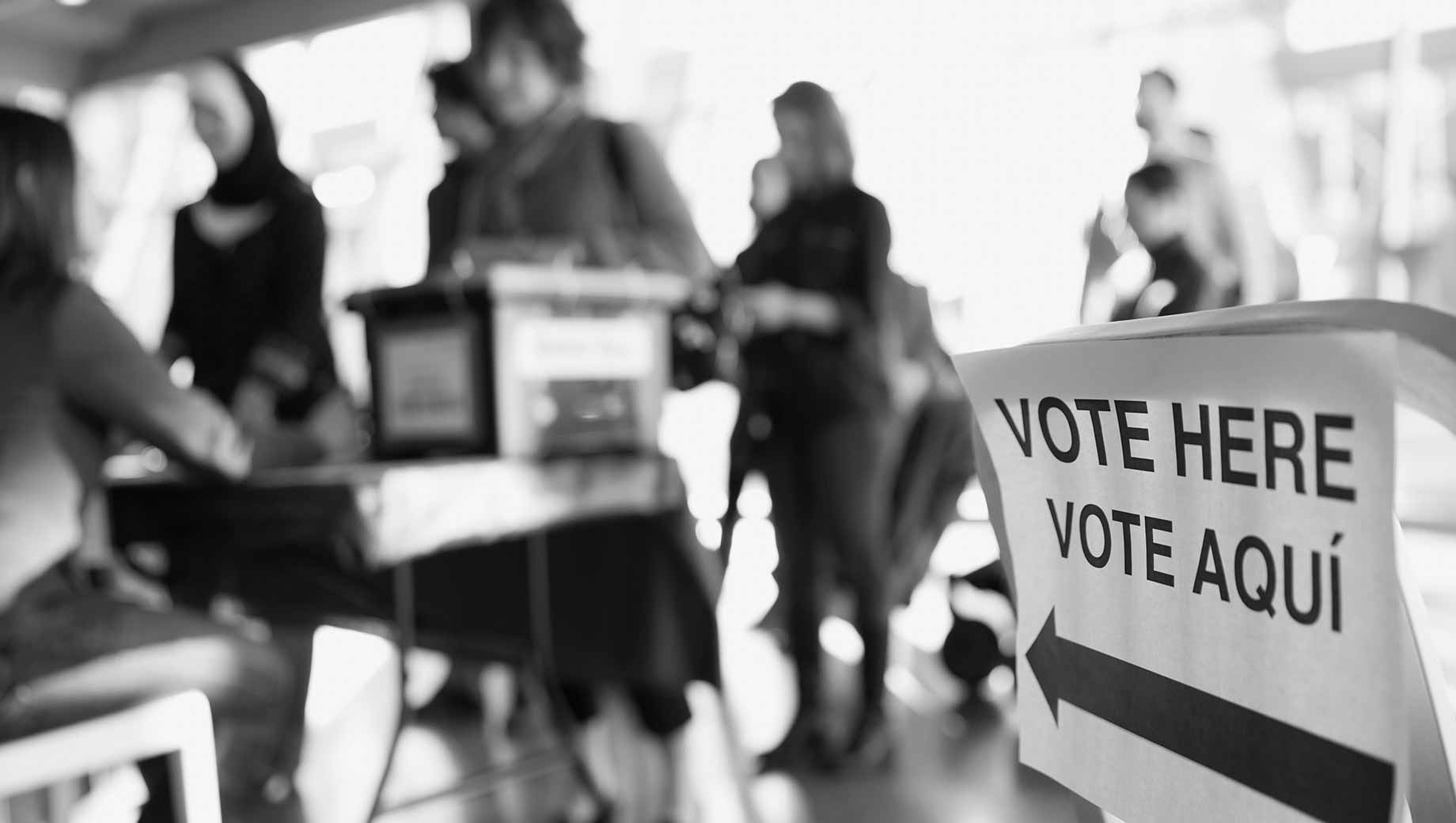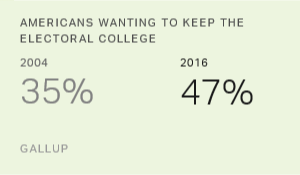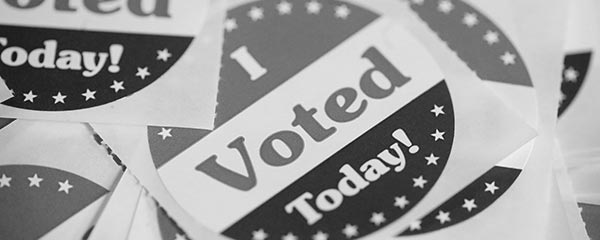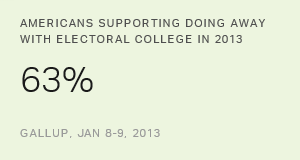Story Highlights
- 55% prefer amending the Constitution to base winner on popular vote
- 53% oppose states awarding their electoral votes to popular vote winner
- Americans not highly concerned with Electoral College system issues
WASHINGTON, D.C. -- Americans issue a split decision on two proposals that would determine presidential election winners based on the national popular vote.
By 55% to 43%, U.S. adults support amending the Constitution so that the winner of the popular vote would win the election rather than keeping the current Electoral College system. However, more say they are against (53%) rather than for (45%) a proposal that would keep the Electoral College system but allow states to award their electoral votes to the winner of the national popular vote rather than the winner of their state's popular vote.

These data come from an April 17-30 Gallup poll. Half of the poll's respondents were asked about each proposal. The split results suggest the public's preference for basing the winner on the popular vote depends on how it would be accomplished.
The idea of eliminating the Electoral College through a constitutional amendment has been circulated for decades. A late 1960s/early 1970s effort arguably came closest, as it passed the U.S. House by a large majority and received an endorsement from President Richard Nixon, but fell victim to a Senate filibuster. There are proposals in both houses of the current Congress to enact a similar popular vote amendment, but doing so would be difficult to achieve given the requirements for amending the Constitution. Nevertheless, Americans favor such an amendment.
As an alternative, 14 states and the District of Columbia have passed legislation to join the National Popular Vote Interstate Compact. This interstate agreement accomplishes the same goal of basing the winner on the popular vote, but through state government legislation rather than a constitutional amendment. States in the compact pass laws to change the way they award their Electoral College votes, giving them to the candidate who wins the most votes nationwide regardless of which candidate receives more votes in the state.
The compact would go into effect once the states agreeing to it account for 270 electoral votes -- the number needed to win the presidency. The 15 jurisdictions that have already passed legislation to approve the change account for 189 electoral votes, and several other states are currently considering legislation to join the compact. Americans are not as supportive of changing the way U.S. presidents are elected through this approach, however.
The gap in support between the constitutional amendment and interstate compact approaches stems from Democrats being less supportive of the "compact" approach than the amendment route. Republicans show similar levels of opposition to basing the winner on the popular vote with both proposals.
| Democrats/Democratic leaners | Republicans/Republican leaners | ||||||||||||||||||||||||||||||||||||||||||||||||||||||||||||||||||||||||||||||||||||||||||||||||||
|---|---|---|---|---|---|---|---|---|---|---|---|---|---|---|---|---|---|---|---|---|---|---|---|---|---|---|---|---|---|---|---|---|---|---|---|---|---|---|---|---|---|---|---|---|---|---|---|---|---|---|---|---|---|---|---|---|---|---|---|---|---|---|---|---|---|---|---|---|---|---|---|---|---|---|---|---|---|---|---|---|---|---|---|---|---|---|---|---|---|---|---|---|---|---|---|---|---|---|---|
| % For | % Against | % For | % Against | ||||||||||||||||||||||||||||||||||||||||||||||||||||||||||||||||||||||||||||||||||||||||||||||||
| Amend the Constitution | 84 | 14 | 24 | 74 | |||||||||||||||||||||||||||||||||||||||||||||||||||||||||||||||||||||||||||||||||||||||||||||||
| States change how they award electoral votes | 69 | 30 | 21 | 77 | |||||||||||||||||||||||||||||||||||||||||||||||||||||||||||||||||||||||||||||||||||||||||||||||
| Note: Respondents were randomly assigned to answer one of the two questions. | |||||||||||||||||||||||||||||||||||||||||||||||||||||||||||||||||||||||||||||||||||||||||||||||||||
| Gallup, April 17-30, 2019 | |||||||||||||||||||||||||||||||||||||||||||||||||||||||||||||||||||||||||||||||||||||||||||||||||||
The current survey marks the first time Gallup has asked about the interstate compact approach, but it has previously asked about amending the Constitution. Historically, the public has favored basing the winner of the presidential election on the popular vote. The lone exception came in a late November 2016 poll. The public was evenly divided, mostly along party lines, a few weeks after Donald Trump was elected president despite losing the popular vote. Otherwise, between 55% and 62% of Americans have favored amending the Constitution to declare the popular vote leader the winner.

Gallup also found support for having the popular vote determine the winner in polls prior to 2000, using another question wording. Between 1967 and 1980, consistent majorities averaging 69% approved of amending the Constitution to "do away with the Electoral College and base the election of a president on the total vote cast throughout the nation."
Public Not Overly Concerned With Electoral College Issues
In two of the last five presidential elections, and in five presidential elections overall, the winner of the popular vote has not won the Electoral College. Thirty-seven percent of U.S. adults say they are very concerned that the winner of the popular vote does not always win the election, and another 26% are somewhat concerned.
Other potential flaws of the Electoral College system garner similar levels of concern, including that small-population states have a disproportionate influence on the outcome, that the system makes it very difficult for independent or third-party candidates to win, and that candidates mostly focus their campaigns on voters in a small number of competitive swing states.
| Very concerned | Somewhat concerned | Not too concerned | Not concerned at all | ||||||||||||||||||||||||||||||||||||||||||||||||||||||||||||||||||||||||||||||||||||||||||||||||
|---|---|---|---|---|---|---|---|---|---|---|---|---|---|---|---|---|---|---|---|---|---|---|---|---|---|---|---|---|---|---|---|---|---|---|---|---|---|---|---|---|---|---|---|---|---|---|---|---|---|---|---|---|---|---|---|---|---|---|---|---|---|---|---|---|---|---|---|---|---|---|---|---|---|---|---|---|---|---|---|---|---|---|---|---|---|---|---|---|---|---|---|---|---|---|---|---|---|---|---|
| % | % | % | % | ||||||||||||||||||||||||||||||||||||||||||||||||||||||||||||||||||||||||||||||||||||||||||||||||
| The winner of the popular vote doesn't always win the election | 37 | 26 | 15 | 22 | |||||||||||||||||||||||||||||||||||||||||||||||||||||||||||||||||||||||||||||||||||||||||||||||
| Small-population states have a disproportionate influence on the outcome | 35 | 29 | 20 | 16 | |||||||||||||||||||||||||||||||||||||||||||||||||||||||||||||||||||||||||||||||||||||||||||||||
| It makes it very difficult for independent or third-party candidates to win | 32 | 29 | 20 | 19 | |||||||||||||||||||||||||||||||||||||||||||||||||||||||||||||||||||||||||||||||||||||||||||||||
| Candidates mostly focus their campaigns on voters in a small number of competitive "swing" states | 27 | 30 | 26 | 17 | |||||||||||||||||||||||||||||||||||||||||||||||||||||||||||||||||||||||||||||||||||||||||||||||
| Gallup, April 17-30, 2019 | |||||||||||||||||||||||||||||||||||||||||||||||||||||||||||||||||||||||||||||||||||||||||||||||||||
Democrats are more likely than Republicans to express concern about all four matters, with the biggest partisan gap coming in the fact that the winner of the popular vote doesn't always win the election -- 58% of Democrats and Democratic-leaning independents are very concerned, compared with 18% of Republicans and Republican-leaning independents. Less than half of Republicans (41%, vs. 85% of Democrats) are at least somewhat concerned.
| Democrats/Democratic leaners | Republicans/Republican leaners | ||||||||||||||||||||||||||||||||||||||||||||||||||||||||||||||||||||||||||||||||||||||||||||||||||
|---|---|---|---|---|---|---|---|---|---|---|---|---|---|---|---|---|---|---|---|---|---|---|---|---|---|---|---|---|---|---|---|---|---|---|---|---|---|---|---|---|---|---|---|---|---|---|---|---|---|---|---|---|---|---|---|---|---|---|---|---|---|---|---|---|---|---|---|---|---|---|---|---|---|---|---|---|---|---|---|---|---|---|---|---|---|---|---|---|---|---|---|---|---|---|---|---|---|---|---|
| % Very | % Somewhat | % Very | % Somewhat | ||||||||||||||||||||||||||||||||||||||||||||||||||||||||||||||||||||||||||||||||||||||||||||||||
| The winner of the popular vote doesn't always win the election | 58 | 27 | 18 | 23 | |||||||||||||||||||||||||||||||||||||||||||||||||||||||||||||||||||||||||||||||||||||||||||||||
| Small-population states have a disproportionate influence on the outcome | 48 | 32 | 22 | 24 | |||||||||||||||||||||||||||||||||||||||||||||||||||||||||||||||||||||||||||||||||||||||||||||||
| It makes it very difficult for independent or third-party candidates to win | 45 | 30 | 19 | 27 | |||||||||||||||||||||||||||||||||||||||||||||||||||||||||||||||||||||||||||||||||||||||||||||||
| Candidates mostly focus their campaigns on voters in a small number of competitive "swing" states | 37 | 33 | 19 | 27 | |||||||||||||||||||||||||||||||||||||||||||||||||||||||||||||||||||||||||||||||||||||||||||||||
| Gallup, April 17-30, 2019 | |||||||||||||||||||||||||||||||||||||||||||||||||||||||||||||||||||||||||||||||||||||||||||||||||||
Bottom Line
The U.S. system for picking presidential winners can sometimes render split decisions, with the popular vote winner losing in the Electoral College in five elections, including two in the past 19 years. Though Americans have historically favored doing away with the Electoral College and basing the winner on the popular vote, their willingness to do so appears somewhat dependent on how that would be accomplished.
They favor an amendment to the Constitution to make that happen, but are more reluctant to have states make changes to how they award their electoral votes. That distinction could be based on the constitutional amendment presumably adopting a more populist approach by following the will of the people. In contrast, the state legislative option -- though achieving the same objective through different means -- may appear to ignore the will of the people (of the state) by disregarding their vote choices in favor of the national will.
Legislative momentum continues to build for the Popular Vote Interstate Compact, although its ultimate fate is uncertain. Like the Electoral College itself, the movement has become politicized. Many Republicans want to maintain the status quo that has resulted in the party winning the 2000 and 2016 elections despite its candidates losing the popular vote. Consequently, no reliably Republican states have joined the compact, and almost all the states that have joined the compact are reliably Democratic states. Some that are considering joining the compact are battleground states, including Arizona, Michigan, Minnesota, Nevada and North Carolina, while others -- Oklahoma and Arkansas -- are reliably Republican.
Although the constitutional amendment approach to abolishing the Electoral College appears to be the less viable course of action, it is the approach that Americans are more inclined to support.
View complete question responses and trends.
Learn more about how the Gallup Poll Social Series works.



